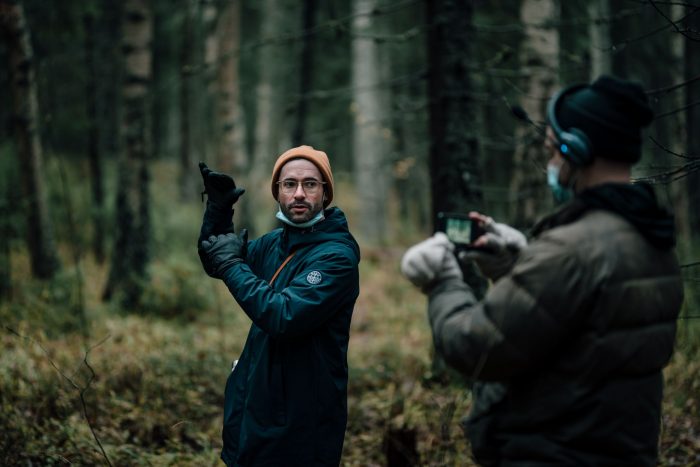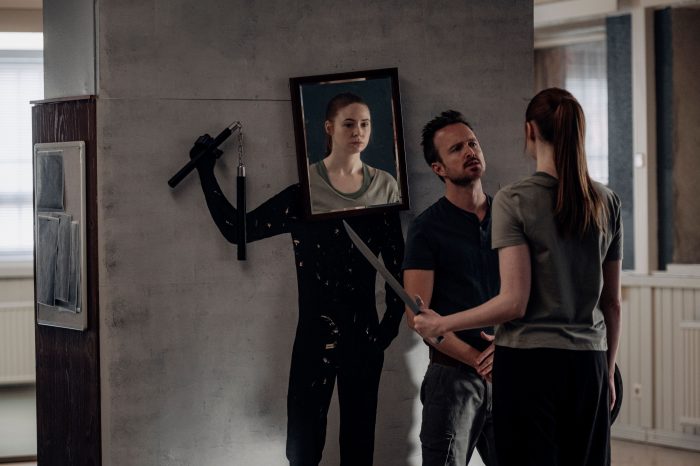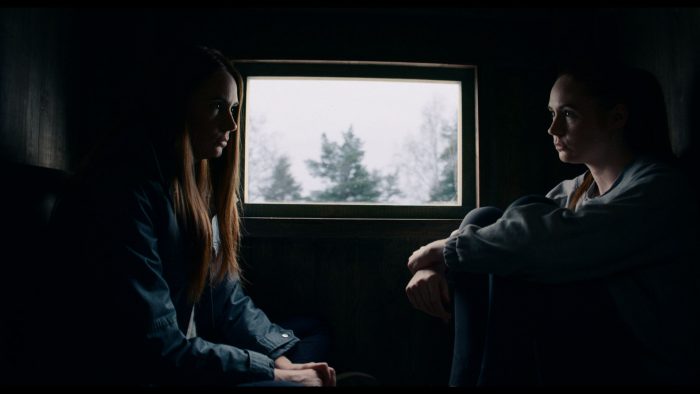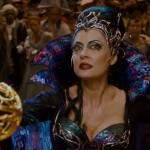Dual is the third feature film from writer-director Riley Stearns, whose prior features – including 2014’s Faults and 2019’s The Art of Self-Defense, starring Jesse Eisenberg and Imogen Poots – have not just struck gold on the film festival circuit but established a signature approach to black comedy.
Guardians of the Galaxy’s Karen Gillan stars and co-stars as protagonist Sarah and her clone in this morbidly clever sci-fi satire, which also stars Aaron Paul (Breaking Bad) and Beulah Koale (Hawaii Five-0).
Facing down a terminal diagnosis, Gillan opts for a lab-grown and genetically identical replacement to carry on her legacy. When she unexpectedly makes a full and medically inexplicable recovery, Sarah is legally required to face her doppelgänger in deadly combat to determine who will remain.
After premiering at this year’s Sundance Film Festival to critical praise, Dual is set to hit US cinemas today. We had the immense pleasure of chatting with Riley Stearns about the production challenges he faced in the midst of the COVID-19 pandemic, the ‘happy accidents’ of filmmaking, how his signature deadpan approach has developed throughout his career and how the multi-faceted musician and artist Emma Ruth Rundle became involved in scoring Dual.
Finding a shooting location for Dual amidst the COVID-19 pandemic was – as with many film and television productions – quite an ordeal. What was the process of that journey for you, and why was Finland ultimately the final destination?
Riley: Initially, before COVID, we were planning on an early 2020 shoot, probably in the Pacific Northwest of the United States, like Seattle or Portland. But then Vancouver was an option. We talked about Toronto as well. And then COVID hit, and we kind of the put the movie on the backburner, thinking: “let’s see how long this lasts”.
Obviously, it lasted longer than we originally thought. But at a certain point, we knew that we still wanted to shoot the film and we wanted to shoot it safely. So the idea of shooting in various parts of the United States was still floated; Vancouver and Toronto were an option, but it was going to be very challenging because their numbers were still pretty high and only growing.
At that point, XYZ had a film fund that our film was going to be the first to dip into the finance the film. The fund was out of a company out of Finland, and they presented us with the idea of shooting in Finland. We looked at the options there; I immediately jumped at the opportunity. A couple of other places were maybe going to be on the table, but what was really nice about Finland was that their numbers had always stayed very low. But they also weren’t going to require the same quarantine times as long as we tested and handled ourselves properly.
So we ended up choosing Finland to shoot, and I think what was probably the benefit to the movie in terms of shooting of there really became the look of the film. The architecture is completely different from the United States, but you still have this very Pacific Northwest look to it, which I had always seen in my head as being the location where we would shoot. It afforded us a real world-building sort of space that I was so happy to explore.

Film-making is full of happy accidents.
Riley: People think that you plan literally everything. Even some of your favourite movies that were planned immaculately and meticulously have happy accidents that directors embrace. I think that Finland was one of those happy accidents.
Dual taps into a darkly funny deadpan that has become a trademark of yours, and it’s something with which a lot of writers and directors struggle to stick the landing. Is black comedy an approach that comes naturally to you as a writer and director, or has that simply been what felt like the right approach for the stories you’ve told in your films so far?
Riley: Probably a bit of both. The first short I ever made was a straight horror-drama that I hope people do not search for, because it’s so bad, and it’s probably findable on various image-sharing sites or whatever. But it felt like it was me trying to be somebody I wasn’t. I made a short called Casque, which was just an experiment – but once I made The Cub, prior to Faults, that one really just felt like me. It felt like I didn’t have to try to be somebody I wasn’t.
I really love making people laugh, and I’m not funny in person, per-se, and I’m not a comedian by any stretch of the imagination; but I like writing dialogue and I like figuring out ways to make people laugh through the exchange of words. I started finding myself in a space that I felt more comfortable in more than I had ever been, including all the scripts that I wrote before I even got to before Faults that will never see the light of day either.
I just really like dark comedy. I like that life is darkly funny; it’s never fully comedic, with no drama to it. By the same token, even in the darkest times, there are things that have some sense of levity to them. I like living in that grey area, myself – but by the same token, I like that my characters are very black and white about the world that they live in and the world that they explore. So it’s comfort for me, but I also feel like the stories that I have tended to write work best in that world as well.

Karen Gillan was a logical choice to explore that world; she’s not only a superb dramatic actress but also very funny. Was she your first choice as the lead?
Riley: It’s just how it goes. Saying that she’s not the first choice is not a knock; it’s just that I wasn’t familiar as much with her as an actor because there are so many people out there. You go, “okay, who’s available?”, and “who’s at the same agency that I’m at,” because that helps as well. You get a list of people who are financeable or not financeable. All that stuff is just so crazy to me.
When I get to sit down and actually have a conversation with somebody, I know if they’re the right person to work with or not. Karen and I had a meeting where she expressed interest in the role, and I immediately saw a person that I knew I would love to work with. We hit it off from that point, and she got it.
What was cool, too, is that by this point there are two other movies prior to Dual that you can watch and know how I work and how actors have worked with me in the past. She was able to come in with a really good perspective of where Dual might go; had this been my first feature, it would have maybe been a bit trickier to sync up with that.
Between her, Aaron (Paul) and Beulah (Koale), for those weeks on the movie, I felt like I was very safe. I felt like they trusted me as well. Karen and I got to really explore the differences between these two characters and figure out who Sarah and her double really were.

Dual is your second collaboration with musician Emma Ruth Rundle. How did your collaborative relationship kick off?
Riley: I forget sometimes that she helped me with the short I made during COVID (The Blanket). She did that as kind of an experiment in working with me, leading into the feature. If COVID had never happened, I definitely never would have made that short; we would have had our first experience working together on this feature. I was really fortunate that we had that moment to feel out each other’s process and practice before we got to Duel.
I was a big fan of hers. I posted a couple of records I’d bought, and I forget who one of the artists was, but it was Old Man Gloom and a pop artist. Somebody in the comment section said, “this is gonna sound weird, but I think the mix of these two would be an artist called Emma Ruth Rundle”. I remember pulling up Real Big Sky with this acoustic drone, really detuned acoustic guitar thing where it’s sludgy but then she’s got these beautiful vocals over it. I was just like, “oh my god, she’s so good”.
I reached out to her via Instagram DM blindly, and just said that I haven’t written it yet, but I made a movie called Faults and I’m about to make a movie called The Art of Self Defence, and I think you would be really cool for this movie I want to write called Dual. To my surprise, she wrote back and said that even though she’d never made a score before, she would be very interested.
We just kept in touch over the years, and I kept her involved as I wrote the script. I listened to Electric Guitar I while I wrote the script, and that album was a great, informative piece for me in terms of how I wanted the score to go; in that I wanted it to predominantly be guitar. Emma was then able to see the movie and write specifically to it.
We had the best working relationship; I loved her process. Not everyone who is good at making music is good at scoring. She’s somebody who is very, very good at seeing something on-screen and relating a tone via her music to that screen. I hope that not only does she work with me again, but I hope she continues to work as a composer for other people. I’m very excited, too, because I think we’re going to release her score on vinyl through Sargent House. At some point, people will be able to own it – which is pretty cool. Selfishly, I’m very excited about that too.
DUAL is screening in US theatres from April 15.




